![]()
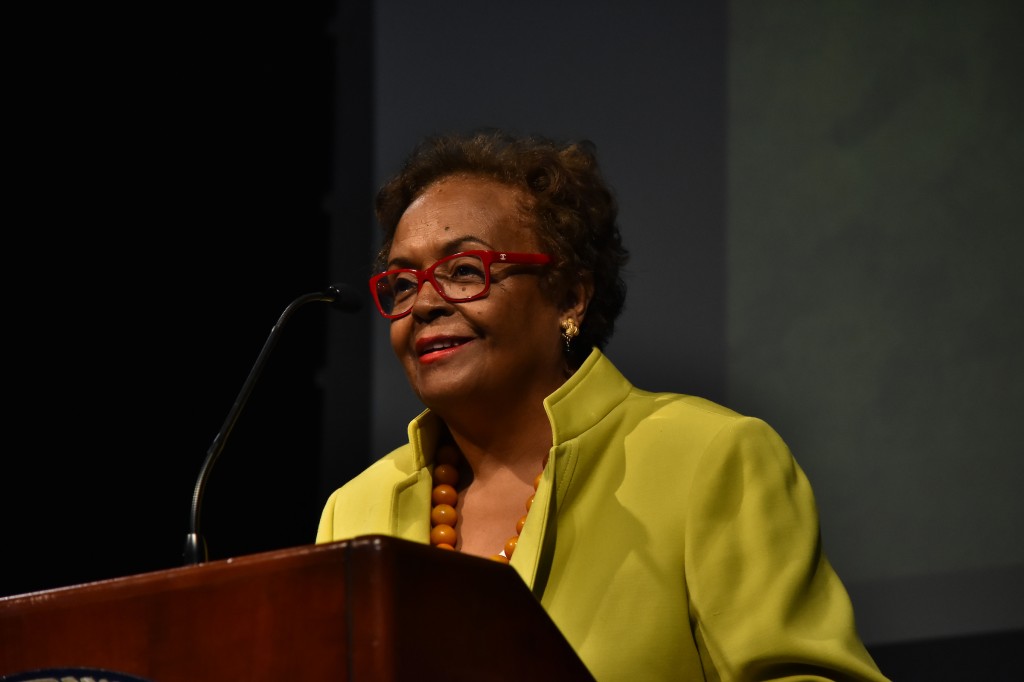
Dr. Joyce Ladner stood at the podium, her eyes peering into our souls from behind red frames. The distinct glasses hinted of the spirited and fiery student from the 1960s that lived inside her. I could almost see her.
Ladner, professor of sociology, and former provost and interim president of Howard University, was the guest speaker at the Margaret Walker Center’s 50th Annual Dr. Martin Luther King Jr. Birthday Convocation held in the Rose E. McCoy Auditorium on Tuesday, Jan. 23.
Had it not been for the Margaret Walker Center, I would have had little to no idea of Ladner’s existence or contributions that helped to make my life less gritty and onerous. At times, it’s difficult to comprehend that people who survived and endured some of the darkest days during our nation’s history are still in our midst.
They are treasure chests of wisdom and reminders of an era that we perhaps forget more than we should remember. As Dr. William B. Bynum Jr., university president, greeted us with warm and robust gusto, I earnestly awaited to hear from the author and scholar.
[dropcap]B[/dropcap]orn in the small town of Battles, Ladner had been expelled from Jackson State University in 1961 for leading a civil rights protest. I don’t believe the irony was lost on anyone in the sparsely filled room. For me, it was as transparent as air. I could not wrap my head around the idea that my alma mater, an HBCU, had once dismissed students for daring to protest the uncivilized and unequal treatment of black people.
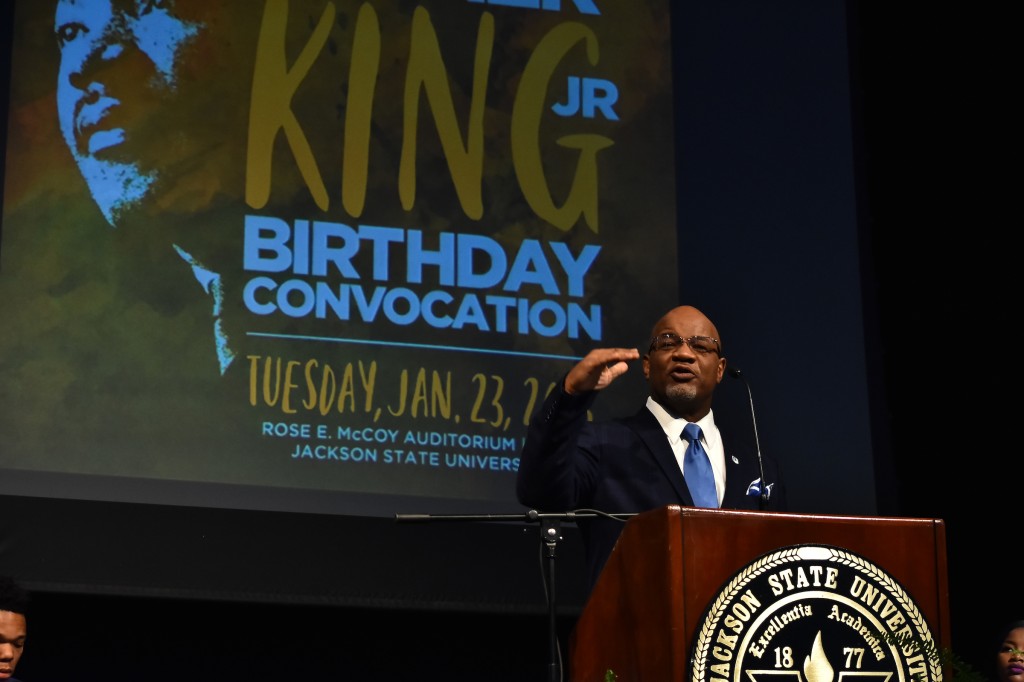
But it had been a different time, as Ladner would remind us. In the 60s, JSU was still Jackson State College, and Mississippi was steeped in Jim Crow traditions. Heavy and jagged traditions that Ladner would help to crack and shatter like a crowbar smashed against glass.
And she did so in the company of friends and allies: Medgar Evers, Vernon Dahmer, Fannie Lou Hamer, and Clyde Kennard.
Ladner would also reveal to us her encounters with Dr. Martin Luther King Jr., whom she described as ‘an extraordinary and gifted man and not a superhero.’
Opening with acknowledgments, she pointed out her two sisters – seated front row – colleagues and members of the Mississippi Veterans of the Civil Rights movement who had come to hear her speak and perhaps reminisce.
Of the students participating in the program, Ladner said they were more sophisticated than she was at their age because the ‘world has changed so much.’
Then she spoke of Margaret Walker with sincere love and appreciation, calling her an intellectual genius, friend and mentor.
“She was one of the most grounded and well-rounded individuals I knew,” she said before launching into a short story about how Walker had come to write the popular and moving poem ‘For My People.’
She then reminded us that we were there to honor King’s legacy of service.
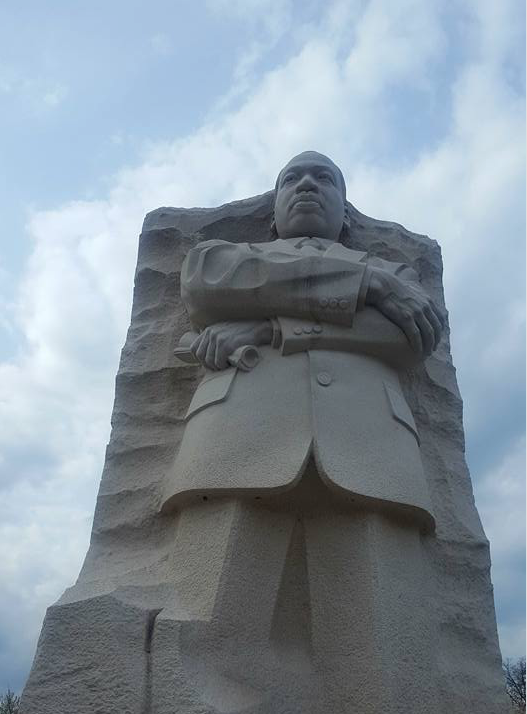
“To honor his service makes his legacy one that is more meaningful for us as we learn the value of carrying out service to others in need throughout the year,” she said.
[dropcap]L[/dropcap]adner shared that King was much more to her than a historic figure who has been immortalized in a 30-foot granite statue in Washington, or streets and schools named for him, or the federal holiday that is the only one for an African American and the only one from a national president of the United States.
In a sagacious tone, filled with discernment and lessons, Ladner confirmed to us that she participated in her first civil rights demonstration on March 27, 1961, on our campus.
“There had been lunch counter sit-ins all over the South but none in Mississippi, which was considered then, the most racially violent place in the country,” she said.
Ladner and her sister, Dorie Ladner, would visit Medgar Evers at his office during the periods when they were free from classes.
They were both freshmen when the Tougaloo Nine were arrested (Nine African-American students from Tougaloo College who held a sit-in in the old Jackson Municipal Library in 1961 to force integration of the library).
Ladner, Dorie and other classmates held a sympathy prayer meeting for them in front of the Jackson State College Library. She was a freshman when then Jackson State College president Jacob L. Reddix broke up the meeting, and later that evening evicted Ladner’s roommate, Eunice, from school for her participation in the prayer vigil.
The next day Ladner was one in a group of students who marched to the courthouse for the arraignment of the Tougaloo Nine. They made it as far as the intersection of West Pearl and Rose Street before encountering a barricade of police who shot tear gas into the atmosphere.
“My sister (Dorie) still has scars from the tear gas, and they chased us with police dogs,” said Ladner, who fled from the promise of the brutality that awaited her if she were caught.
In search of shelter, Ladner said she knocked on the screen door of a home, but no one answered. She could hear the sound of a radio and glimpse a woman inside ironing clothes, so Ladner reached her hand through the screen and unlocked it.
[dropcap]L[/dropcap]adner explained that she and another young lady ambled inside and asked the lady for asylum to which the lady responded: ‘No one is going to bother you in my house.’
Once they were safely back on school grounds, Reddix had called an early spring break and everyone went home. However, Ladner said that when she and her sister returned they were informed by a dean that they would be expelled at the end of the semester due to their civil rights activities.
Their response to the news, according to Ladner, was: “We don’t care that you’re expelling us. We’re transferring to Tougaloo.”
What a loss for our HBCU, I thought. Others must have believed the same. Ladner shared that several years ago, at the prompting of Mississippi activist Owen Brooks, former JSU President Ronald Mason sent them a letter of apology.
Ladner further disclosed that one of the things the letter said was: ‘institutions don’t always do what’s right at the time, but what’s right now is to acknowledge the wrong that was done then.’
We, the audience, clapped loudly. It was the only act of celebration we had at our disposal. A small gesture for the attempted correction of such a large injustice.
[dropcap]I[/dropcap]t was at Tougaloo that Ladner first met King when he came to the college to speak. It was the first of several encounters she would have with the civil rights icon. But, she points out that she is not boasting and if we, the audience, had lived during the same period, we would have been open to the same opportunities to meet him, too.
“He grew larger in death than he did in his lifetime,” she said.
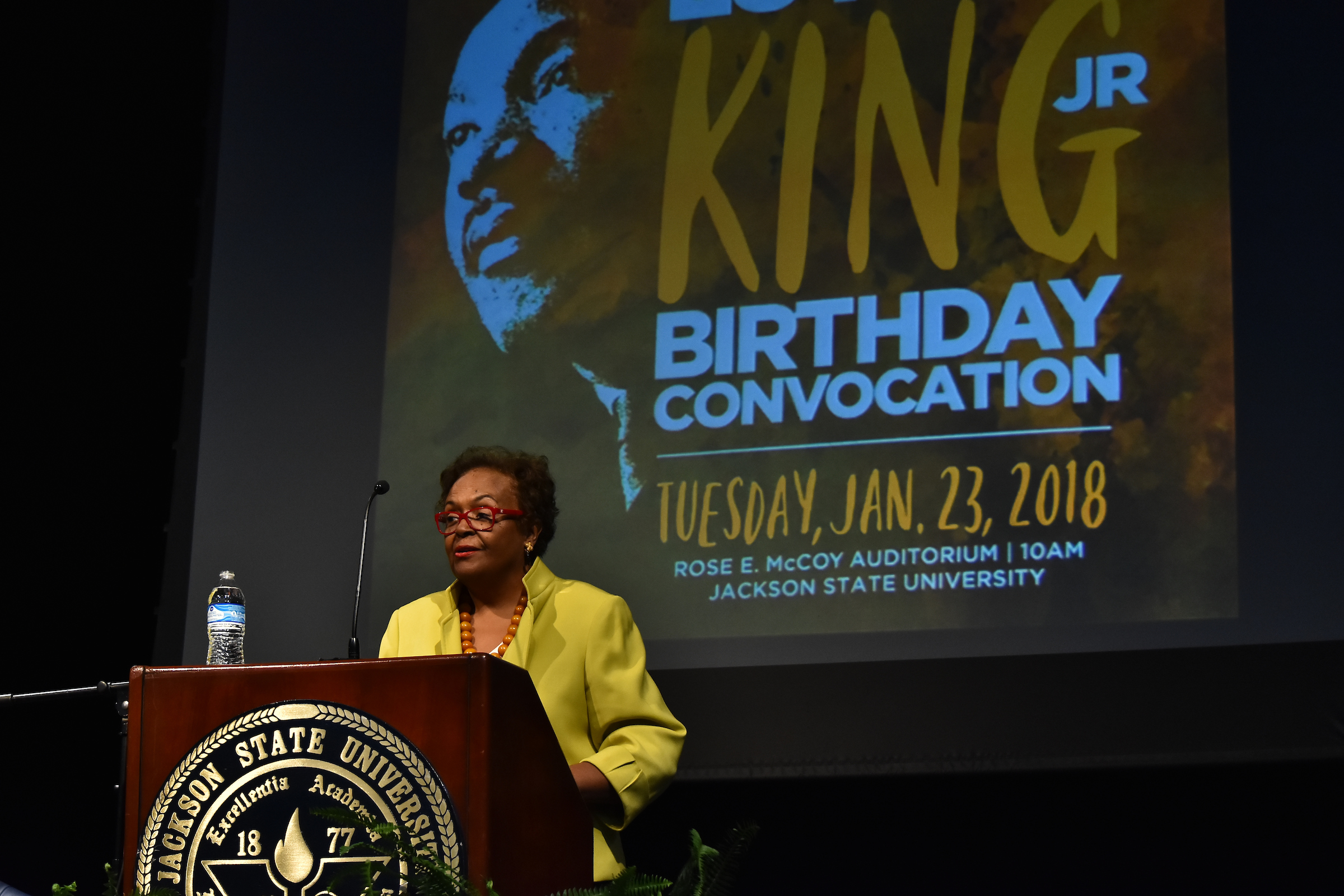
[dropcap]I[/dropcap]n the summer of 1963, Ladner recounts being sent to D.C. by the Student Nonviolent Coordinating Committee (SNCC) to work as a staff member at the March on Washington headquarters. She was 19, and her job was to raise money for chartering buses to bring black people from the Deep South to D.C.
“I met with King twice in the march office when the group of civil rights leaders would come to meetings. I also remembered he was the only one who would come back into the area where we were working,” she said.
Due to her staff pass, which gave her free range, Ladner was on the stage with King when he gave his famous “I Have a Dream” speech.
After his assassination, she and Dorie flew to Atlanta for King’s funeral. Ladner recalled peering down at his body housed in a casket at Spelman College Sisters Chapel. She remembered marching behind the same casket through the streets of Atlanta to the burial site.
“His death, for me, symbolized my end of innocence and the end of the non-violent era,” she said. “Where I had once had the hope of an innocent child. Growing up in the rigorously segregated Mississippi, once he died, I felt bereft.”
I’m sure there were others who shared her sentiments. There are so many others who have given so much of themselves to the movement; sacrificing their time, bodies and already limited freedoms.
I am sorry that Ladner, a woman of immense educational achievements, had to take a literacy test three times to register to vote. I am sorry for all three times she was told that she had failed. I am sorry that some of us take our vote for granted and don’t even bother. I am sorry that she endured a week in jail for trying to integrate Galloway United Methodist Church. A church, a place that should always be free of bias.
And, I was sorry that the Rose E. McCoy Auditorium was not overflowing with students and people. People who now have the freedom to be almost anything and be anywhere but in the auditorium listening to living history.
Towards the end of her speech, Ladner said she wondered what Fannie Lou Hamer and others would think about the police choking death of Eric Garner, of the Black Lives Matter Movement, and the continued murder of young black men and children by the police and citizens across the country.
“How many of the old fights must be found anew?” she asked.
And, like Ladner, I too wonder.
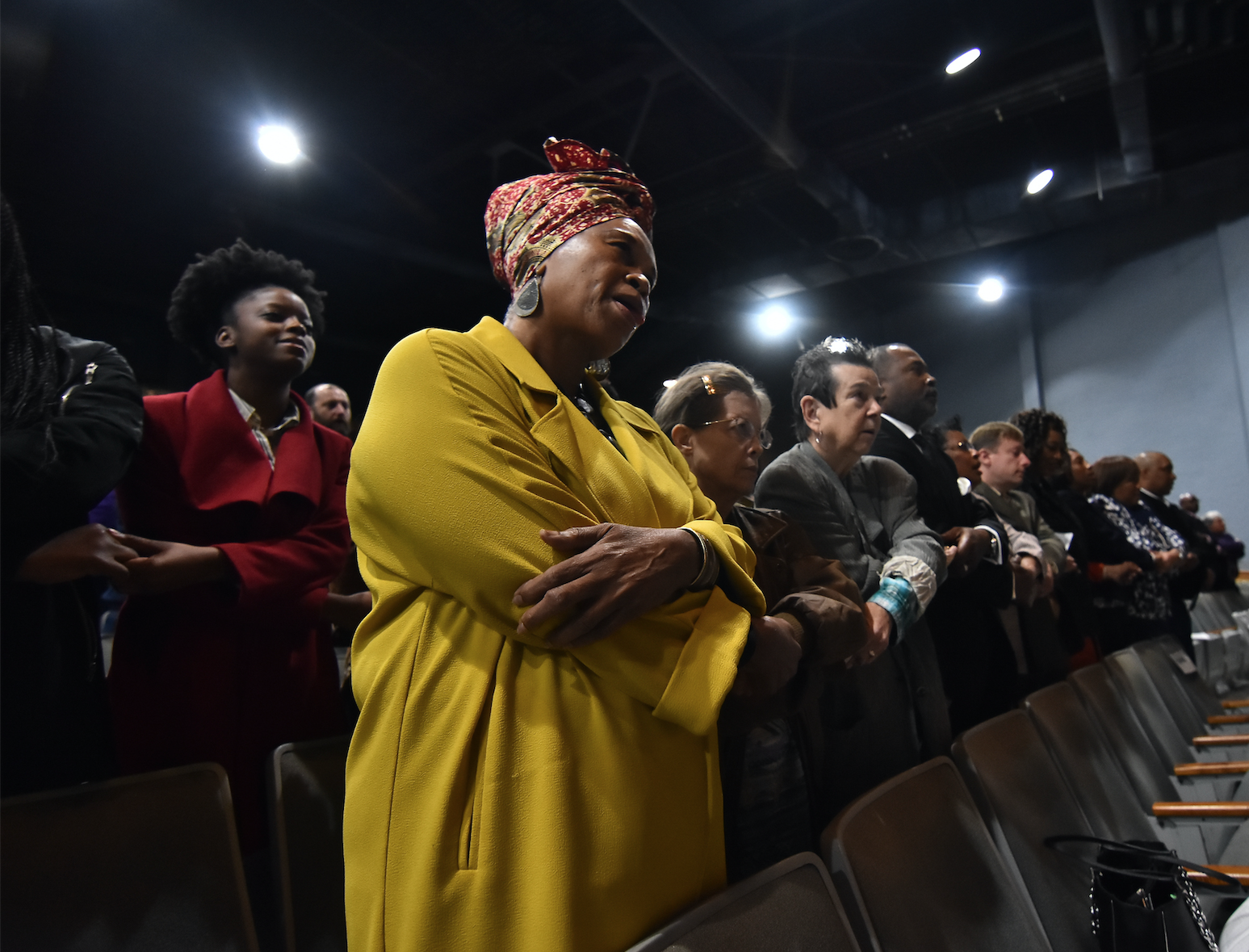
The opinions expressed in this article are those of the author and do not necessarily reflect in any way the views and opinions of Jackson State University.






